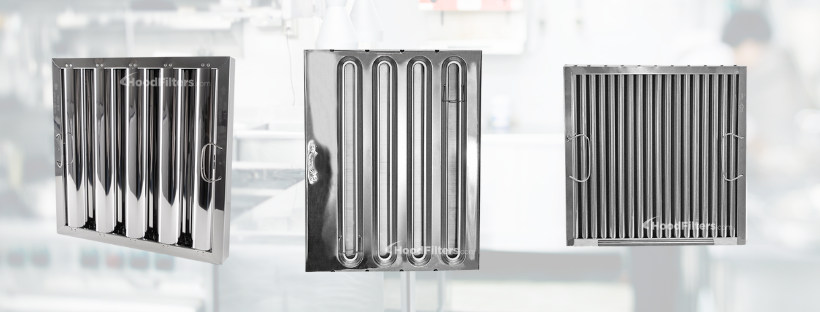It’s essential to recognize the silent yet significant impact of this often-overlooked factor. Indoor air quality can directly affect the health, comfort, and overall experience of both kitchen staff and patrons. By understanding the complexities of hood filters and their role in combating indoor air pollution, we can unlock the key to a safer and more enjoyable culinary environment. So, let’s embark on this exploration, shedding light on the importance of proper ventilation and the critical connection between hood filters and a pristine atmosphere in commercial kitchens.
Understanding the Relationship Between Hood Filters and Indoor Air Quality in Commercial Kitchens
Commercial kitchens are bustling spaces full of delicious aromas, but they also harbor a hidden threat: indoor air pollution. Without high-quality hood filters, airborne particles, grease, smoke, and odors emitted during the cooking process can infiltrate the whole kitchen. These pollutants pose risks to everyone in the vicinity, compromising the health of kitchen staff and potentially affecting the quality and safety of the food being prepared.
Sources of Indoor Air Pollution
Sources of indoor air pollution in commercial kitchens are diverse and include cooking activities that involve frying, grilling, and broiling, which release fine particles and grease into the air. Smoke generated from cooking, especially when grilling or using charbroilers, can also be a major contributor to poor indoor air quality. Moreover, the release of volatile organic compounds (VOCs) from cooking oils and various food ingredients can further degrade the air in the kitchen.
Without effective ventilation and reliable hood filters, these pollutants can linger and accumulate, creating an unpleasant and unhealthy environment for all. Understanding these sources is essential to finding effective solutions for better indoor air quality in commercial kitchens.
Health Risks of Poor Air Quality
Indoor air pollution in commercial kitchens presents a serious concern. It affects not only the health and comfort of kitchen staff but also the overall customer dining experience. Luckily, an effective solution exists: hood filters. These crucial components capture and filter out airborne contaminants like grease, smoke, and odors, enhancing indoor air quality in commercial kitchens.
To grasp the importance of hood filters and their impact on indoor air quality fully, we need to look at the science behind them. This article explores the mechanics of filters, how they enhance indoor air quality, and the advantages of using high-quality filters.
Join us as we reveal the secrets behind hood filters. Discover how these filters can transform your kitchen’s atmosphere, creating a safer and more enjoyable environment for both staff and customers. Let’s explore the science that makes hood filters an indispensable part of a well-maintained commercial kitchen. 
Understanding Indoor Air Pollution
Commercial kitchens are bustling spaces where a variety of culinary processes, from frying to baking, contribute to indoor air pollution. Primary culprits include airborne grease, smoke, and odors.
Without proper ventilation and effective hood filters, these airborne grease particles can coat kitchen surfaces with sticky residue, creating hygiene issues and potentially leading to a serious fire hazard. Moreover, they can build up on air ducts and upblast exhaust fans, causing inefficiency in the kitchen’s ventilation system. To ensure a safer and more efficient kitchen environment, it is crucial to recognize the pivotal role of hood filters in keeping grease from infiltrating the air ducts and mitigating the risks associated with poor indoor air quality.
Hood Filters Keep Grease From Entering Your Air Ducts
Cooking with oils and fats produces airborne grease particles. If not filtered properly, these tiny droplets can coat kitchen surfaces with sticky residue, creating hygiene issues. They can also build up on your duct work and upblast exhaust fan, causing them to be inefficient as well as cause a serious fire hazard. Eventually, it is also likely to result in rooftop grease buildup, which can lead to a whole host of other problems.
Hood Filters Reduce Smoke
Cooking at high temperatures generates smoke. This mixture of fine particles and volatile organic compounds (VOCs) can impair air quality, leave stubborn odors and residues, and even affect food taste.
Hood Filters Reduce Odors
The cooking process creates strong, lingering odors that can permeate the kitchen and adjacent areas. This can result in an unpleasant atmosphere that persists long after cooking has ended.
Poor indoor air quality in commercial kitchens can lead to serious health effects for both kitchen staff and patrons. Inhaling polluted air can cause respiratory irritation, exacerbate asthma symptoms, and even trigger allergic reactions.
Understanding these health risks makes it clear why it’s so important to manage indoor air pollution. An effective ventilation system, especially with well-functioning filters, can significantly improve indoor air quality. Our high efficiency pollution control filters are also a great first line of defense against airborne contaminants. Later, we’ll look at how hood filters work and how they mitigate the effects of grease, smoke, and odors on indoor air quality.
Learn more about Pollution Control Units in this short video.
Respiratory Irritation
Inhalation of airborne particles and pollutants can cause irritation in the respiratory system, leading to coughing, sneezing, and throat discomfort. The presence of smoke and VOCs in the air exacerbates these symptoms, particularly for individuals with pre-existing respiratory conditions.
Asthma Exacerbation
For individuals with asthma, poor indoor air quality can trigger or worsen asthma symptoms. The presence of allergens, such as cooking-related particles and odors, can induce wheezing, shortness of breath, and chest tightness, making it challenging to work or enjoy a meal in the kitchen environment.
Allergic Reactions
Some individuals may be sensitive or allergic to specific allergens present in the kitchen air, such as certain spices, food particles, or cleaning agents. Exposure to these allergens can lead to allergic reactions, including skin rashes, nasal congestion, watery eyes, and itching.
It is crucial to recognize that the health risks associated with poor indoor air quality extend beyond the kitchen staff. Patrons dining in a restaurant with compromised air quality may experience discomfort, reduced appetite, or even allergic reactions, which can negatively impact their overall dining experience.
By addressing the sources of indoor air pollution and understanding the potential health risks involved, we can better appreciate the importance of effective ventilation systems and, specifically, the role of hood filters in improving indoor air quality in commercial kitchens. In the following sections, we will explore how hood filters work and how they effectively mitigate the impact of grease, smoke, and odors on indoor air quality.
The Role of Hood Filters
Hood filters, key components of kitchen ventilation systems, sit within the range hood or exhaust canopy directly above the cooking area. They serve as the first defense line against airborne particles and contaminants.
Hood filters capture and trap airborne particles using physical barriers and filtration media. This results in reduced grease, smoke, and odor levels in the kitchen, creating a healthier environment. It also helps protect the rest of your kitchen ventilation system from your air ducts all the way to your upblast exhaust fan. 
Hood Filters Minimize Smoke and Help Neutralize Odors
Hood filters capture airborne particles and contaminants before they spread through the kitchen. In doing so, they help prevent grease accumulation on surfaces, reduce smoke levels in the kitchen, and lessen lingering odors. Commercial kitchen filters are designed to target grease, smoke, and odors:
How Hood Filters Capture Grease
Grease particles are a common byproduct of cooking with oils and fats. Hood filters like baffle or mesh filters create a maze-like path for the airflow, causing airborne grease droplets to stick to the filter surfaces. This prevents the grease from recirculating in the kitchen or settling on surfaces.
Smoke Reduction
Some hood filters use additional filtration media like activated carbon filters or electrostatic precipitators to capture smoke particles and VOCs. This minimizes their presence in the kitchen air, reducing health risks.
Odor Elimination
Activated carbon filters are effective in reducing cooking odors. The activated carbon attracts and retains odor-causing molecules, which leaves the air fresher.
By targeting these specific sources of indoor air pollution, hood filters significantly improve indoor air quality in commercial kitchens. In the next section, we’ll dive deeper into the filtration process, exploring how hood filters capture and remove grease, smoke, and odors to ensure a cleaner and safer kitchen environment.
How Hood Filters Improve Indoor Air Quality
Filtration Process for Grease Capture
Hood filters employ a multi-step filtration process to effectively capture and remove grease particles from the air. As the contaminated air passes through the filter, the following steps occur:
Impingement
The first stage of the filtration process involves impingement. Grease-laden air is forced to change direction as it encounters the filter’s baffles or mesh layers. This change in airflow direction causes the grease particles to collide with the filter surfaces.
Condensation
The collision between the airborne grease particles and the filter surfaces results in condensation. The particles lose their momentum and adhere to the filter media, preventing them from continuing their journey through the ventilation system. This condensation process effectively traps the grease particles, preventing them from recirculating into the kitchen or settling on surfaces.
Smoke Reduction and Containment
Hood filters play a crucial role in reducing and containing smoke within the cooking area. Smoke particles are typically fine and can easily disperse throughout the kitchen, affecting both air quality and visibility. The filtration process of hood filters, especially those equipped with additional filtration media, helps minimize the impact of smoke:
Particle Filtration
The physical barriers of hood filters, such as baffle filters or mesh filters, act as effective particle filters. They capture and retain smoke particles as the air passes through the filter, preventing them from escaping into the kitchen or being recirculated.
VOC Reduction
Hood filters with activated carbon filters or electrostatic precipitators further enhance smoke reduction. These additional filtration components capture volatile organic compounds (VOCs) present in smoke. Activated carbon, in particular, has a high affinity for VOCs, adsorbing them and effectively reducing their concentration in the air.
By containing and reducing smoke, hood filters contribute to a safer and more comfortable working environment for kitchen staff, minimize the risk of setting off fire alarms, and improve the overall cleanliness of the kitchen. 
Odor Reduction and Air Freshness
Unwanted cooking odors can permeate the kitchen and adjacent areas, impacting the ambiance and overall dining experience. Hood filters, particularly those equipped with activated carbon filters, help reduce odors and improve air freshness:
Adsorption of Odor Molecules
Activated carbon filters possess a large surface area with countless microscopic pores. As the kitchen air passes through the activated carbon layer within the hood filter. This is where odor-causing molecules become adsorbed onto the carbon’s porous structure. This adsorption process effectively traps and neutralizes the odors. The result? Fresher and more pleasant air.
How the Type of Hood Filter You Use Affects Filtration Efficiency
The presence of activated carbon in hood filters enhances the overall filtration efficiency. It does this by capturing a broader range of odor-causing compounds. This comprehensive approach ensures that a wide variety of cooking odors, including those from spices, ingredients, and cooking techniques, are effectively reduced.
- By reducing odors and improving air freshness, filters create a more inviting and enjoyable environment for kitchen staff and patrons alike.
- Through their comprehensive filtration process, filters significantly contribute to improving indoor air quality in commercial kitchens.
- Hood filters capture and removing grease particles, reduce smoke dispersion, and adsorb odors. This creates a cleaner, healthier, and more pleasant kitchen environment.
In the next section, we will explore the benefits of using high-quality hood filters. We will start by focusing on their long-term impact on indoor air quality and overall kitchen safety .
Benefits of Using High-Quality Hood Filters
Investing in the best hood filters is crucial for ensuring optimal indoor air quality and maintaining a safe and clean kitchen environment. Here are some key reasons why it’s important to prioritize the quality of your filters:
Enhanced Filtration Performance
High-quality hood filters are designed with advanced technology and superior materials. , enabling them to provide more efficient and effective filtration. They have a higher capacity to capture and retain airborne particles, grease, smoke, and odors, resulting in cleaner and healthier air. This can be especially important for smaller facilities, including mobile kitchens served by food truck hood and exhaust systems. 
How High-Quality Hood Filters Improve Safety
Kitchen fires are a significant concern in commercial kitchens. High-quality hood filters are specifically engineered to capture and remove grease particles, reducing the risk of grease buildup in the ventilation system. By minimizing the accumulation of grease, these filters contribute to a safer environment by reducing the potential for fire hazards.
High-quality hood filters offer improved efficiency and longevity compared to lower-quality alternatives. The benefits of using filters include:
- Longer Lifespan: Premium hood filters are built to withstand the demands of commercial kitchen environments. They are constructed with durable materials that can endure regular cleaning and maintain their filtration effectiveness over time. This longevity reduces the frequency of filter replacements, resulting in cost savings for the kitchen owner.
- Reduced Maintenance and Downtime: High-quality filters are designed to be easier to clean and maintain. They often feature removable and dishwasher-safe components, making the hood filter cleaning process more convenient and efficient. With less time spent on maintenance, kitchen staff can focus on their core tasks, reducing downtime and improving overall productivity.
The positive impact of first rate filters extends beyond their functionality and durability. These filters contribute to a healthier indoor air environment and promote sustainability in the kitchen:
- Improved Indoor Air Quality: By effectively capturing and removing grease, smoke, and odors, the best hood filters significantly improve indoor air quality. This leads to a more comfortable and pleasant working environment for kitchen staff, reducing the risk of respiratory issues and allergies. It also enhances the overall dining experience for customers, as they can enjoy meals in an environment free from unpleasant odors and airborne pollutants.
- Environmental Responsibility: Top-quality hood filters often incorporate sustainable features and materials. Some filters are designed for long-term use, reducing waste generation compared to disposable filters. Additionally, manufacturers of well-made filters may prioritize eco-friendly production processes and use recyclable materials, aligning with sustainable practices and reducing their environmental footprint.
Ventilation Solutions from HoodFilters.com
As you can see, high-quality hood filters are essential for maintaining optimal indoor air quality, promoting safety, and enhancing the overall environment in commercial kitchens. Their superior filtration performance, extended lifespan, and positive impact on air quality make them a worthwhile investment for any kitchen owner or operator.
At HoodFilters.com, we offer a wide range of hood filters designed to meet the diverse needs of commercial kitchens. Our filters are effective, durable, and easy to clean, making them a practical and cost-effective solution for maintaining good indoor air quality. 
Conclusion
So, there you have it. We’ve explored the nitty-gritty science of hood filters, discussed the risks of airborne contaminants in your kitchen, and drilled down on why the right hood filters can really make a difference. Investing in top-notch hood filters isn’t just a smart move—it can be a game changer. And in a world where we all need to look after our planet, choosing high-quality hood filters isn’t just common sense—it’s doing your bit for the environment.
Need a hand selecting hood filters for your commercial kitchen? No problem! Connect with us via live chat on HoodFilters.com, email us at customerservice@hoodfilters.com, or give us a call at 877-394-9731. Our crew is ready and waiting to help you choose the right filters for your hood. When it comes to creating the safest, most efficient kitchen you can, we’ve got you covered. Explore our range of commercial kitchen ventilation equipment and let us help you clear the air in your kitchen.
